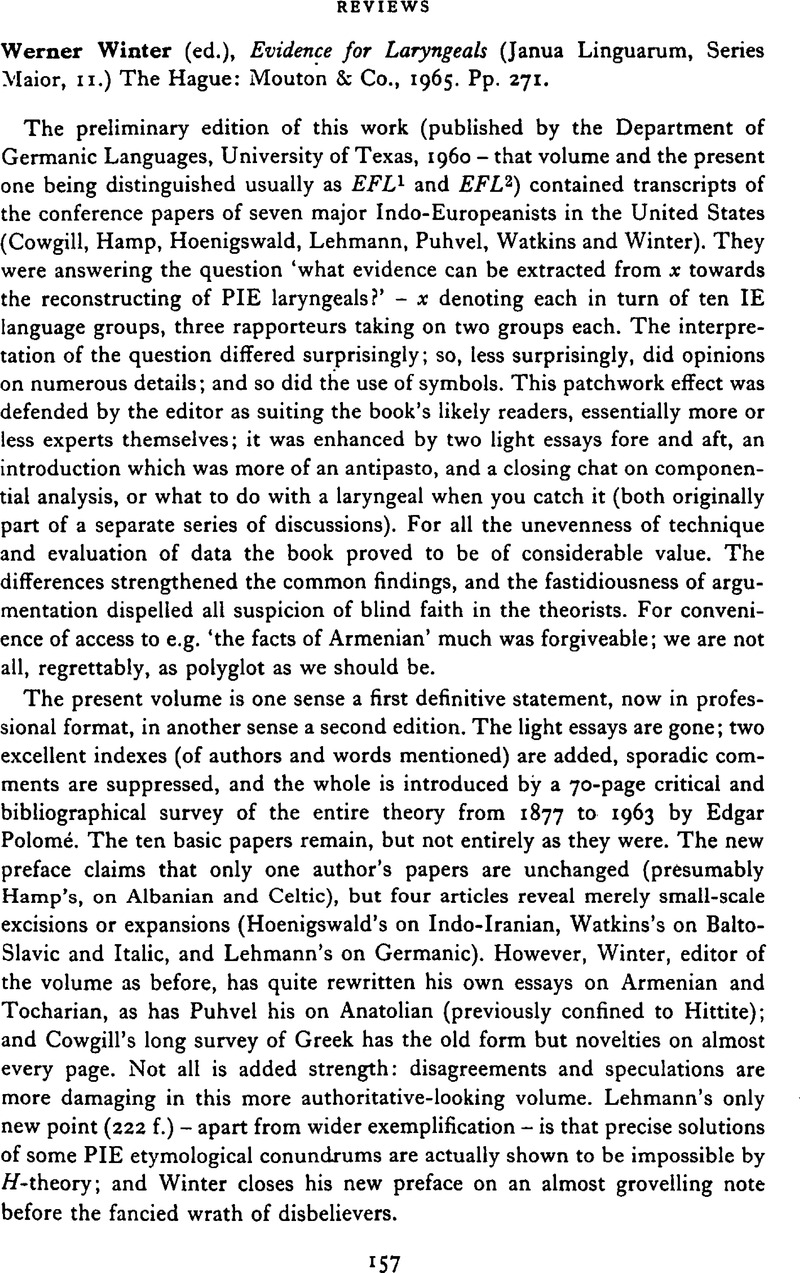No CrossRef data available.
Published online by Cambridge University Press: 28 November 2008

[1] The progress of this debate in print is confusing, as Watkins's first discussion presumes prior knowledge not only of Cowgill's attitude in his paper on Greek but of his comments (on fugāx) which form a coda to Watkins's own paper. The manner of reference to this at EFL 1 188 is misleading; at EFL 2 182 it is defeating, as Cowgill's obiter comments have vanished from the second publication. Moreover, Watkins's second defence (in the appendix discussed above) and Cowgill's third attack (at EFL 2 17670) do not connect at all.
[2] More likely tabernāculum was analogical: cf. Varro's verbal origin for cenāculum, cited above.
[3] But one should not speak of this as ‘a legal term so profoundly rooted in Latin tradition’ on the basis of the XII Tables, of which the language is largely affected by Grecism (and the basic law even more so – cf. Palmer, L. R., The Latin Language, 3rd ed., 1961.64).Google Scholar
[4] Cowgill's resistance to seeing e.g. μολ as a regular reflex of mlO (and βλώσκω as para-digmatically affecting its colour) rests on a belief that CRO must give Greek Crā, as in пρ![]() τος (пρ
τος (пρ![]() τος being influenced by пρό). He is scrupulous in admitting (149) that пρ
τος being influenced by пρό). He is scrupulous in admitting (149) that пρ![]() τος is one of his only two pieces of evidence for this development. It is only fair to say that his subsequent study of the IE superlative has caused him to retract this origin for the ‘first’ word, in favour of *пρο-ατος, despite the problems of West Greek vowel contraction which arise.
τος is one of his only two pieces of evidence for this development. It is only fair to say that his subsequent study of the IE superlative has caused him to retract this origin for the ‘first’ word, in favour of *пρο-ατος, despite the problems of West Greek vowel contraction which arise.
[5] There are other awkwardnesses of argument in this chapter. Cowgill objects (166) when Lehmann credits *H- to ζύμη on the basis of etymological connexion with ζυγόν. His sole ground for objection is that he has already disposed of ζυγόν in this connexion, ‘so that evidence for an initial laryngeal in ζύμη is in turn unsatisfactory WHETHER OR NOT’ (my emphasis) ‘we accept Lehmann's connection of the two words’ – strange logic. Cowgill also gives (15733) approval to Szemerényi's intermediate stage *gw onā for γυνή the > υ shift depending on the labial environment (so also κύκλος). But if the next stage is *gw una, with labial dissimilation then giving rise to γ, why not *κυτε, *γυλος, χυνος instead of пότε, βόλος, φόνος, etc.? Hamp's *gwnā, or even Krogmann's *gwonā, is less troublesome.